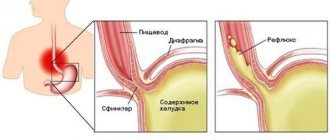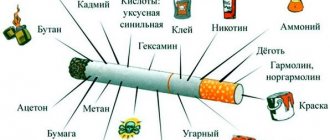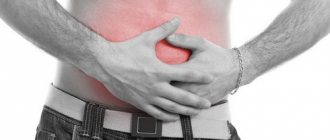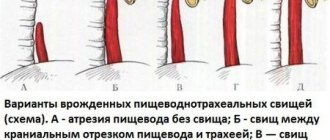The article was checked by gastroenterologist and endoscopist Kondrashova E.A. , is for general informational purposes only and does not replace specialist advice. For recommendations on diagnosis and treatment, consultation with a doctor is necessary.
At the Clinical Hospital on Yauza, they will quickly and accurately identify the cause of heartburn and help you get rid of the unpleasant symptom. The qualifications of our gastroenterologists, modern technologies and expert equipment (endoscopy, endosonography, CT and MRI, all laboratory diagnostics, etc.), an individual and comprehensive approach to each patient ensure high efficiency of conservative and/or surgical treatment of the entire spectrum of diseases that cause heartburn.
Heartburn is a burning sensation in the chest area or in the pit of the stomach. Sometimes this sensation rises to the base of the tongue, accompanied by a bitter or sour taste in the mouth.
Heartburn usually occurs some time after eating; it can be triggered by bending over, physical exertion, or a certain type of food.
Causes of heartburn
The physiological cause of heartburn is the entry of acidic stomach contents into the esophagus. In a normal state, this is prevented by the circular muscle at the junction from the esophagus to the stomach, which blocks access to gastric juice, and its accidental reflux is neutralized by the alkaline components of the contents of the esophagus.
Thus, diseases that interfere with normal motility of the esophagus and/or stomach can lead to heartburn. Among them:
- Inflammatory diseases of the upper gastrointestinal tract (esophagus, stomach, duodenum): esophagitis, gastritis, duodenitis. One of the reasons for their development may be diseases of the pancreas (pancreatitis), gallbladder and liver.
- Ulcerative and erosive diseases: erosive esophagitis, gastric ulcer, erosions and ulcers of the duodenum.
- Benign (for example, polyps) and malignant neoplasms of the esophagus, stomach and other organs of the upper abdominal cavity.
- Some other diseases: achalasia (enlargement of the esophagus)
- hiatal hernia
- diseases of the mediastinal organs (the space in which the esophagus is located).
- increased acidity of gastric juice,
Why does heartburn occur?
30.04.2021
The causes of heartburn esophageal mucosa to various irritants, reflux of stomach into the esophagus , etc. Normally, food enters the stomach through the esophagus , which is a hollow muscular tube.
Eating food into the stomach often happens on the street, which happens at different times of the year in autumn and winter, so a viral attack and infection in a person can also overtake you.
After ensuring the missed food from the esophagus into the stomach , this task of separating them and further preventing the acidic contents of the stomach the esophagus is performed by the so-called cardiac sphincter, consisting of muscles.
If for some reason the sphincter does not work, gastric contents reflux into the esophagus , and the person feels a burning sensation behind the sternum or heartburn , which causes pain. Similar pain is experienced when bile is thrown back from the duodenum into the stomach .
According to the US Digestive Research Institute, every twentieth person on the planet suffers from heartburn , which causes discomfort and poor health.
There is a more significant problem - peptic heartburn , which is caused by a constant acidic effect on the base of the esophagus in the retrosternal region. In addition to unpleasant belching, the patient feels a constant burning sensation.
In this case, he must immediately undergo an endoscopic examination in order to determine the level of acidity of gastric juice and determine the cause of the constant burning sensation in the upper abdomen .
The main causes of heartburn:
- improper, unbalanced diet;
- heavy food intake with a lack of fluid;
- addiction to foods that stimulate increased acid secretion in the stomach (onions, chocolate, foods containing mint, fatty foods with spicy additives and seasonings, citrus fruits, garlic, some types of tomatoes, ketchup);
- consumption of drinks containing caffeine, citrus fruits, carbonated water, alcohol;
- eating a large meal immediately before bedtime;
- excess body weight;
- smoking;
- a tightly tightened belt on trousers;
- sleeping with your head bowed low;
- stress, nervous overexcitation;
- hard physical labor;
- functional disorders of the pancreas .
What needs to be done?
If you feel constant discomfort caused by the cause of heartburn , then you need to reconsider your lifestyle, diet, and eating process.
In the evening, eat no later than 3 hours before bedtime. Don't overeat or overload your stomach . Eat slowly, chewing your food thoroughly. Eating is a process in which both the nervous system and the digestive organs take part. Do not fill your stomach with poorly chewed pieces of food that are extremely difficult for it to digest. Eliminate foods that trigger heartburn from your diet .
Pay attention to your clothes. Do not tighten your stomach with tight belts, especially after eating.
Normalize your body weight, stop drinking alcohol, drink more clean water and herbal tea. Move more, walk, exercise, especially in the morning.
When lying down, your head should be higher than your feet .
Engage in physical labor, as it helps digest food faster. Feel the difference between an idle lifestyle and an active one physically and mentally. You will be pleasantly surprised: your health will improve, your sleep will become stronger, your appetite will increase. In addition, physical labor disciplines a person.
Published in Gastroentorology Premium Clinic
Diagnosis of the causes of heartburn
Examination for heartburn at the Yauza Clinical Hospital includes the following steps:
Consultation with a gastroenterologist , who, if necessary, can prescribe additional studies, including those not related to gastrointestinal pathology, for example, electrocardiography.
Laboratory diagnostics , including clinical and biochemical blood tests, stool examination, tests for the presence of Helicobacter pylori, determination of acidity.
Modern endoscopic examinations (esophagogastroduodenoscopy, if necessary, colonoscopy), endosonography. For this purpose, hospital specialists use the modern endoscopic system PENTAX MEDICAL (Japan), which allows them to expand the range of possibilities, significantly speed up the examination and increase its accuracy.
Ultrasound diagnostics , including advanced combined approaches, for example, triplex scanning and combined examination with endoscopy.
X-ray, CT and MRI - diagnostics of the condition of the organs of the neck, chest, and abdominal cavity.
Elimination of the oncological threat - effective programs for identifying tumor formations using MRI - oncological search (complex MR diffusion). Expert level research, for example, genetic testing for predisposition to the development of tumors, including esophageal cancer. Blood tests for tumor markers.
Heartburn
Gastroenterologist, Head of Gastroenterology Department No. 1
Lazovskaya M.A.
Heartburn is a burning sensation behind the breastbone that spreads along the esophagus. It may be accompanied by a feeling of fullness in the stomach, bitterness or acidity in the mouth, and worsens when bending over or lying down.
Heartburn occurs when stomach contents back up, or reflux, into the esophagus. Aggressive gastric juice irritates the walls of the esophagus, which is manifested by a burning sensation.
How does heartburn occur?
When the lower esophageal sphincter relaxes uncoordinatedly or very weakly, acidic stomach contents can back up into the esophagus. This reflux is called gastroesophageal (gastroesophageal) reflux and often causes heartburn, that is, a burning sensation behind the breastbone, where the ribs meet.
The occurrence and severity of gastroesophageal reflux and heartburn are influenced by various factors, including:
- the ability of the lower esophageal sphincter muscles to open and close correctly
- composition and volume of gastric juice entering the esophagus during reflux
- quality and speed of cleansing of the esophagus from harmful substances that have reached its mucosa
- neutralizing effect of saliva and others.
What should you pay attention to and in what case should you consult a doctor?
Symptoms resembling heartburn can be observed with some diseases of the internal organs that have absolutely no connection with heartburn and require completely different treatment under the supervision of a doctor.
In order to understand whether you really suffer from heartburn, pay attention to the following points:
- Typically, heartburn pain is felt in the chest, just behind the breastbone, and not in the abdomen. If you feel pain in your stomach, then most likely it is not heartburn.
- Usually, there are no other noticeable symptoms other than heartburn (a burning sensation in the chest). If, at the same time as a burning sensation or chest pain, you experience other symptoms (for example, severe weakness, shortness of breath, dizziness), there is every reason to believe that you are not suffering from heartburn.
- Heartburn usually appears immediately after eating or after a person lies down. If you have pain and a burning sensation in your chest during physical activity, it may be caused by angina pectoris.
If you have chest pain and burning that has one or more of the above characteristics, be sure to consult a doctor.
In addition to the situations described above, be sure to consult a doctor if:
- You are not sure that you have heartburn and have never consulted a doctor about your symptoms;
- Despite treatment at home, the symptoms of the disease do not go away or even worsen;
- You feel difficulty swallowing food;
- Have you noticed weight loss;
- From time to time, attacks of severe heartburn recur, and you do not know what this may be connected with;
- You have black vomit or vomit with traces of blood;
- Your temperature has risen above 38 C, weakness and chills have appeared;
- You started having hiccups and don’t go away for a long time;
- You notice that your stool (feces) has become black and runny
How to get rid of heartburn?
The recommendations listed below are not universal. Patients should keep a diary so they can be helped to better manage their symptoms. Each of the items listed below contributes to the development of symptoms and should not be avoided until it has been proven that they do not aggravate the symptoms in a given patient. Discuss all of these recommendations with your doctor.
- Avoid foods, drinks and medications that interfere with the action of the lower esophageal sphincter or irritate the lining of the esophagus, such as fried or fatty foods
- chocolate
- mint
- alcohol
- coffee (decaf coffee too)
- carbonated drinks
- ketchup and mustard
- vinegar
- tomato sauce
- citrus fruits and their juices
- aspirin, anti-inflammatory and pain relievers, except acetaminophen.
- Reduce the portion sizes of food you eat. Don't overeat!
- Eat food no later than 2-3 hours before going to bed.
- Raise the head of the bed by 10–15 cm, using, for example, telephone books.
- If you are overweight, lose weight.
- Avoid situations that may increase pressure on the abdominal cavity, as this can provoke reflux from the stomach into the esophagus. Try simple things like avoiding tight clothing or body-hugging outerwear. Less obvious causes of reflux include squats, leg lifts and abdominal exercises.
- Quit smoking, as cigarettes reduce the ability of the lower esophageal sphincter to work properly.
Lifestyle changes to help manage heartburn
Gastroesophageal reflux disease occurs when the lower esophageal sphincter muscles do not function properly. This causes acidic stomach contents to flow into the esophagus (reflux). GERD and its most common symptom, heartburn, can be worsened by foods, certain medications, and other factors. Here are some tips to help reduce heartburn.
- Don't go to bed with a full stomach
. Eat at least two to three hours before going to bed - this will give the food a chance to digest and leave the stomach, then the acidity level will decrease before adopting a body position in which heartburn is most likely to occur. - Don't overeat
. Reduce portion sizes per meal, or try to eat four to five small meals a day instead of three large meals.
- Eat slowly
. Give yourself plenty of time to eat - don't rush. Try to periodically put your fork down while eating.
- Wear comfortable, loose clothing
.
- Avoid heartburn triggers
. Avoid foods and drinks that may cause heartburn (such as onions, peppermint, chocolate, caffeinated drinks such as coffee, citrus fruits and juices, tomatoes, and foods high in fat). A useful way to find out which foods trigger your symptoms is by keeping a diary.
- Get rid of excess weight
. If you are overweight, losing weight may relieve symptoms.
- Stop smoking
. Nicotine, one of the main active ingredients in cigarettes, can weaken the lower esophageal sphincter, a muscle that controls communication between the esophagus and stomach and prevents acidic stomach contents from entering the esophagus.
- Avoid alcohol
. If you want to relax after a stressful day, try replacing alcohol with exercise, walking, meditation or deep breathing.
- Keep a Heartburn Diary
. Record the time when heartburn occurs, as well as the circumstances that may have caused it.
If heartburn gets worse when lying down:
- Raise the head end of the bed
so that the head and chest are higher than the legs. You can do this by placing six-inch blocks under the legs of the bed. Don't use too many pillows for this. This will only change the position of your head, which can lead to increased pressure in the abdominal cavity and worsen heartburn.
- Don't eat at night
. Try to have your last meal at least three hours before bed.
If heartburn gets worse after exercise:
- Consider meal times
. At least two hours must pass after eating before you can start exercising. If you start earlier, heartburn may occur.
- Drink more water
. Drink enough water before and during physical activity to prevent dehydration.









